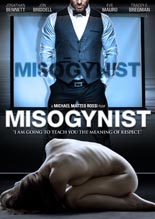
 Not every movie dares open with a quote from 18th-century moralist Samuel Johnson. (Then again, I don’t watch the History channel.) Michael Matteo Rossi’s Misogynist does, with this: “Men know that women are an overmatch for them, and therefore, they choose the weakest or the most ignorant.” The next 77 minutes set out to prove the theory. And frickin’ how!
Not every movie dares open with a quote from 18th-century moralist Samuel Johnson. (Then again, I don’t watch the History channel.) Michael Matteo Rossi’s Misogynist does, with this: “Men know that women are an overmatch for them, and therefore, they choose the weakest or the most ignorant.” The next 77 minutes set out to prove the theory. And frickin’ how!
Heartbroken Harrison (Jonathan Bennett, Mean Girls) is crying over a Dear John letter when who should walk on by but smooth-talking mystery man Trevor (Jon Briddell, Midnight Movie), who dismisses the missive as “typical bullshit a woman would say.” With the flip of a business card, he advises Harrison, “All you need is conditioning.”
 Three years and one title card later, Harrison is under Trevor’s employ, rounding up soul-crushed dude-bros to whom Trev can espouse his brand of female-hating “conditioning.” (Harrison must be terrible at his job, because the audience can be counted on one hand.) A sample of Trevor’s vindictive venom: “All woman are exactly the same. Every woman … wants to get fucked. All woman want to be hurt. They love that sting. All women want to be controlled. And I’m here to teach you how to control.”
Three years and one title card later, Harrison is under Trevor’s employ, rounding up soul-crushed dude-bros to whom Trev can espouse his brand of female-hating “conditioning.” (Harrison must be terrible at his job, because the audience can be counted on one hand.) A sample of Trevor’s vindictive venom: “All woman are exactly the same. Every woman … wants to get fucked. All woman want to be hurt. They love that sting. All women want to be controlled. And I’m here to teach you how to control.”
Although this two-bit Frank T. Mackey (Tom Cruise’s character in Magnolia) is the most chauvinistic of the bunch, the film is less his story than about the effects of his teachings — specifically, how years of ingesting hate speech takes a toll on Harrison as he enters into holy matrimony. (Marital advice from the boss: “Fuck her before she fucks you.”) That his fiancée, April (Danielle Lozeau, Werewolf Rising), would choose a life with Harrison given his résumé when she is devout to a virginity-intact degree is but one boulder of incredulity along Rossi’s road. Their honeymoon scene, just post-consummation, is set up as Misogynist’s emotional climax, yet feels like warmed-up leftovers from a high school playwrights’ competition. Unfortunately, most of the movie does.
Operating on a higher plane than his castmates, Briddell unequivocally commits to portraying the hateful, unpleasant, despicable Trevor (“Chow down on my cock. I didn’t unzip it to feel a breeze”). Yet the movie overflows with hateful, unpleasant, despicable characters; not even April is patchable for viewer sympathy.
In fact, until the out-of-place “where are they now?” coda, I was unable to tell whether writer/director/producer Rossi was decrying or enabling the very behavior his actors depict without filters. In more skilled hands, the intent would be clear; when it is not, the ending — indeed, the film’s purpose — simply does not deliver the message it believes it has. Misogynist isn’t so bad to stir up ill will — just indifference. —Rod Lott
